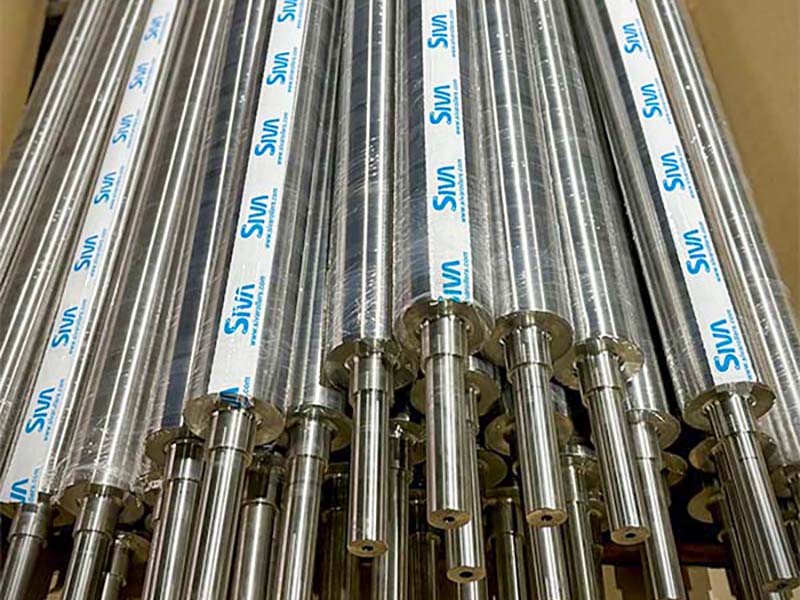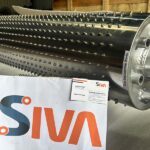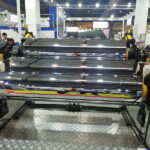What is a Industrial Roller? Types, Applications & Benefits Explained
In the vast world of industrial manufacturing, industrial roller play a silent yet vital role. These cylindrical components may not be the most glamorous part of a production line, but without them, entire processes would come to a grinding halt. From guiding and supporting materials to enabling smooth transfers and precise finishing, rollers are essential in ensuring efficiency and quality across various industries.
What is a Industrial Roller?
At their core, industrial roller are cylindrical components designed to carry, guide, press, or transfer materials through a machine. They rotate on bearings or shafts and are engineered from a variety of materials depending on their use—rubber, steel, polyurethane, and more.
Types of Industrial Rollers
Industrial roller come in various forms, each designed to serve a specific purpose depending on the nature of the material being processed, the type of machine, and the operating environment. Let’s explore some of the most widely used types of industrial roller and their real-world applications:
Rubber Roller
Rubber roller are among the most common types used across multiple industries. Known for their flexibility, they provide excellent grip, shock absorption, and chemical resistance. These rollers are typically used in printing presses, textile machines, and packaging units where material handling requires smooth contact and precise tension.
Use-case: In the printing industry, rubber rollers apply ink and guide paper accurately. In textiles, they assist in calendaring and coating processes.
Ebonite Coated Roller
Ebonite coated roller are rubber roller with a hard, vulcanized rubber surface. Ebonite offers exceptional hardness (usually between 80–95 Shore A), resistance to heat, and excellent performance under pressure. These rollers are ideal for high-speed machines requiring dimensional stability.
Use-case: Widely used in laminating machines and gravure printing, where consistent surface contact is critical.
Stainless Steel Guide Roller
Stainless steel guide roller are designed for strength, corrosion resistance, and high durability. They’re used to guide and align materials through machinery without introducing frictional damage. The precision of these rollers is crucial in processes that demand tight tolerances.
Use-case: Ideal for paper mills, film processing lines, and food-grade applications where hygiene and accuracy are paramount.
Heat Transfer Roller
Heat transfer roller are engineered to evenly distribute and transfer heat to materials such as films, textiles, and laminates. They are typically made with a hollow core and internal heating mechanisms or circulate thermal oil/steam for temperature control.
Use-case: Common in lamination units and textile finishing lines where uniform heating improves surface adhesion and material finish.
Expander (Bow) Rollers
Expander rollers, also known as bow rollers, are uniquely curved rollers used to eliminate wrinkles, creases, and slack from web materials. Their bow shape applies outward tension that stretches the material, helping maintain a flat, even web profile.
Use-case: In plastic film, paper, and foil converting industries, expander rollers prevent bagging and ensure consistent winding and slitting.
PU Coated Rollers
PU (Polyurethane) coated rollers strike a perfect balance between elasticity and durability. These rollers are known for their high abrasion resistance, load-bearing capacity, and excellent performance in oil-exposed environments.
Use-case: In high-speed packaging machines and conveyor systems, PU rollers ensure smooth and quiet operation with minimal maintenance.
Applications of Industrial Roller
The applications of industrial roller span across a multitude of sectors. Let’s break it down:
- Manufacturing
In manufacturing plants, rollers are used in assembly lines, forming processes, and coating systems. Their accuracy ensures consistency in mass production.
Technical Insight: A steel roller may have a surface hardness of 60 HRC (Rockwell), providing wear resistance needed for shaping metal parts.
- Packaging
In automated packaging lines, rollers handle materials like plastic films, cartons, and flexible pouches. They maintain alignment and control tension during sealing and cutting.
- Printing & Laminating
Precision is critical in these industries. Rollers control the pressure and speed of substrates like paper, film, or foil, ensuring perfect alignment and adhesion.
Example: A rubber roller with 70 Shore hardness is ideal for ink transfer in flexographic printers.
- Textile Industries
From yarn processing to fabric finishing, textile industries use rollers for washing, drying, calendaring, and dyeing.
Technical Detail: Anti-deflection rollers are used to counter bending during wide fabric processing, ensuring uniform results.
- Film and Foil Processing
Rollers manage delicate substrates like BOPP films, aluminum foils, or PET sheets. Their smooth surfaces prevent scratches and static build-up.
Benefits of Using High-Quality Industrial Roller
Investing in premium roller can transform your production output. Here’s how:
Improved Production Efficiency
Precision-engineered rollers reduce downtime and ensure smooth operation. They maintain tension, prevent slippage, and support high-speed performance.
Enhanced Product Quality
Consistent contact pressure and alignment translate into better printing, laminating, or coating results. This means fewer defects and waste.
Cost-Effectiveness
While high-quality rollers may come with a higher initial cost, their durability and low failure rate offer better long-term value.
Low Maintenance
Well-finished surfaces and high-grade materials mean fewer replacements, less lubrication, and reduced machine wear.
Long Lifespan
Rollers with anti-corrosive coatings or abrasion-resistant surfaces can last for years—especially with regular re-coating or refurbishment.
Why Choose a Reliable Manufacturer – Spotlight on Siva Rollers
To maintain their high performance, follow these practical maintenance guidelines:
When it comes to high-performance and durable rollers, Siva Rollers stands out as one of the most trusted Industrial Roller Manufacturers in India. Known for their innovation and precision engineering, Siva Rollers caters to a wide range of industries across India and abroad.
With decades of experience, they offer custom solutions based on your application needs—whether you need PU rollers in India, high-precision rubber rollers, or heavy-duty chrome-coated rollers. Their state-of-the-art facility in Ahmedabad ensures stringent quality checks, fast turnaround, and global-standard manufacturing.
Why choose Siva Rollers?
- In-house design and fabrication
- Custom roller solutions for niche applications
- High load-bearing and high-speed designs
- Proven track record across printing, packaging, and textiles
- Export-ready with global clientele
Whether you’re scaling up your operations or upgrading existing machinery, Siva Rollers is your partner in performance.
FAQs
Industrial rollers move, guide, press, or finish materials inside machines. In printing presses they transfer ink, in packaging lines they control film tension, and in textile plants they stretch and finish fabric. Without rollers, continuous production would break down.
Rollers can be made from rubber, polyurethane (PU), stainless steel, ebonite, aluminium, or chrome-coated steel. The material depends on the job. PU handles abrasion and oil, rubber grips and absorbs shock, and steel survives heat, pressure, and corrosion.
Printing, packaging, laminating, textile processing, food handling, paper mills, film manufacturing, and every type of conveyor system. Any production line that moves or finishes a sheet, film, fabric, or carton depends on rollers.
Rubber rollers offer flexibility and grip, making them perfect for printing and textile machines. PU rollers (polyurethane) handle high wear, oil, and heavy loads—ideal for conveyors and high-speed packaging lines. PU generally lasts longer under harsh conditions.
Ebonite rollers are rubber rollers with a hardened surface. They stay dimensionally stable at high speeds and under heavy pressure. This makes them popular in gravure printing, lamination, and film processing where precision matters.
Stainless steel rollers resist corrosion, maintain precise alignment, and survive abrasive environments. Food packaging lines, film plants, and paper mills choose steel because it remains smooth, clean, and dimensionally accurate over long cycles.
An expander (or bow) roller has a curved shape. As the flexible web material passes over it, the roller gently stretches the edges outward. Wrinkles and bagging disappear, which is important when winding films, foils, or paper.
A roller’s life depends on material, load, speed, and maintenance. High-quality rollers with proper coating and re-grinding can last several years. PU rollers often outlive rubber rollers in harsh or oily environments.
Most rollers can be reground, re-rubbered, or re-coated instead of replaced. Refurbishment cuts costs and brings rollers back to factory-level performance. Many manufacturers—including Siva Rollers—offer these services.
Common causes include surface wear, improper hardness, misalignment, chemical attack, or overheating. Using the right coating and regular cleaning prevents most failures.
Think about tension, speed, load, temperature, and the material being processed. A packaging machine might need PU rollers for abrasion resistance. A laminator might require chrome-coated or ebonite rollers for smooth pressure and heat transfer. A specialist manufacturer can recommend the exact design.
A cheap roller slips, swells, cracks, or transfers uneven force. A good roller prevents downtime, reduces material waste, improves finish quality, and works faster—all of which save far more money over time.
Several manufacturers supply rollers, but companies like Siva Rollers have in-house design, coating, grinding, balancing, and custom fabrication. That means shorter turnaround, accurate tolerances, and longer roller life.
Because they design rollers for real-world performance: high load-bearing cores, precision grinding, balanced shafts, abrasion-resistant coatings, and application-specific hardness. Clients across printing, packaging, and textiles source from them for reliability and consistent finish quality.



